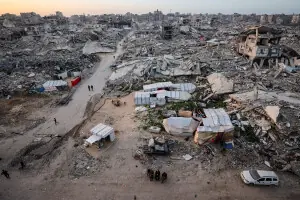India’s federal police arrest three railway employees over deadly train crash
2 min readIndia’s federal police have arrested three railway employees on Friday in connection with the country’s deadliest train crash in two decades that killed 292 people last month, a person with direct knowledge of the matter said.
The arrests were made under Indian penal code sections related to culpable homicide, the source added, requesting anonymity as they were not authorised to speak to the media.
The June 2 crash at Bahanaga Bazar station, in the eastern Indian state of Odisha, also injured more than 1,000 people.
It is India’s worst train crash in more than two decades.
The accident happened when a passenger train hit a stationary freight train, jumped off the tracks and hit another passenger train coming from the opposite direction.
The federal police Central Bureau of Investigation (CBI) had launched an investigation after registering a case of criminal negligence.
Spokespersons for the Indian Railways and the CBI did not immediately respond to Reuters’ requests for comment.
Reuters reported earlier this week that workers repairing a rail-road barrier had made faulty connections in the automated signalling system on the network.
In a report seen by Reuters the Commission of Railway Safety (CRS) investigators said the first collision occurred due to modifications made to the signalling circuit to fix frequent problems at a nearby rail-road barrier.
Local railway staff did not have a standard circuit diagram which led to a faulty connection in the signalling system when they tried to take the boom-barrier circuit offline for repair, it said. The malfunctioning system directed the passenger train onto the path of the freight train, it said.
Indian Railways, the fourth largest train network in the world, is a state monopoly run by the Railway Board. The board reports to the Railways Ministry.
The rail network is undergoing a $30 billion transformation with new trains and modern stations under Prime Minister Narendra Modi’s push to boost infrastructure and connectivity.
For the latest news, follow us on Twitter @Aaj_Urdu. We are also on Facebook, Instagram and YouTube.

























Comments are closed on this story.